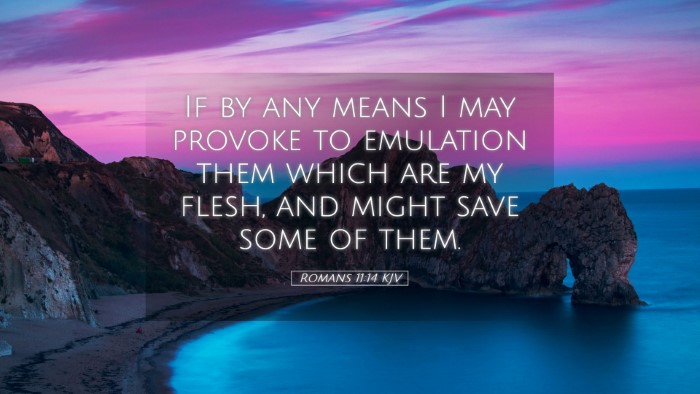Commentary on Romans 11:14
Romans 11:14 (KJV): "If by any means I may provoke to emulation them which are my flesh, and might save some of them."
Introduction
The Apostle Paul's Words in Romans 11:14 necessitate a deep exploration of his intentions, theological implications, and the overall context within his epistle to the Romans. This commentary synthesizes insights from notable public domain commentaries including those of Matthew Henry, Albert Barnes, and Adam Clarke, aiming to deliver a meaningful exposition for pastors, students, and theologians alike.
Context and Background
This verse resides within a critical section of Romans where Paul discusses God’s dealings with Israel and the implications for the Gentiles. The juxtaposition of Jews and Gentiles is vital in understanding the mystery of divine grace and election. Paul recognizes his own Jewish heritage and passionately desires the salvation of his fellow Jews, simultaneously addressing the expansion of God's covenant to Gentiles.
Understanding Paul's Motivations
Paul expresses a profound longing to “provoke to emulation” those from whom he descends. This phrase suggests a strategy rooted not in hostility but in a heartfelt desire for salvation. Paul seeks to inspire jealousy or rivalry among his fellow Jews — a positive form of emulation regarding the grace and blessings experienced by the Gentiles.
Meaning of "Emulation"
The term "emulation" denotes a provocation that could lead to the realization of their need for Christ. Matthew Henry notes that through the visible effects of God's grace among the Gentiles, the Jews might come to desire the same blessing, ultimately leading them to salvation.
Theological Implications
This verse highlights several theological concepts central to Paul's theology, notably the interplay of divine sovereignty and human agency.
God's Sovereignty
Paul’s recognition that some of Israel may be saved suggests the definitive and ongoing nature of God’s election. Albert Barnes elaborates that God’s election is not arbitrary; rather, it reflects His loving purpose in redemption. Paul’s ministry for the Gentiles was part of God's divine plan, signaling that the gospel was intended for all humanity.
Human Responsibility
However, this does not negate human responsibility. Paul’s passionate desire to provoke his kinsmen illustrates that while God is sovereign in His saving work, He also uses means, including the witness of Gentile believers, to draw others to Himself.
Reflections from Public Domain Commentaries
Matthew Henry's Commentary
Henry emphasizes that the apostle’s approach is both pastoral and evangelistic. His desire to rouse his fellow Jews to a realization of their need for Christ exemplifies effective ministry — aiming to draw others to the saving knowledge of Jesus. He argues that this emulation will not only bring Jews to a saving knowledge but will also solidify the grace extended to the Gentiles.
Albert Barnes' Exposition
Barnes elucidates that Paul’s mission epitomizes a divine strategy for salvation. By making the blessings of the gospel evident among Gentiles, Jews can be stirred to see what they have missed. Barnes underscores that this verse reflects a missionary zeal, and the notion of “saving some” resonates with the overarching biblical narrative of God’s desire to redeem humanity.
Adam Clarke's Commentary
Clarke likewise highlights the dual focus on encouragement and warning present in Paul’s statement. The emulation made visible by Gentile believers serves as both a challenge and an invitation to Israel. Clarke posits that Paul’s approach is redemptive; he hopes for a renewed faith among Jews as they observe the outpouring of God’s grace upon the Gentiles.
Pastoral and Practical Applications
The richness of Romans 11:14 offers several meaningful applications for contemporary church leaders and theologians:
- Evangelistic Zeal: Like Paul, modern Christians should maintain a fervent desire for the lost within their communities while employing strategies that showcase the goodness of God.
- Cross-Cultural Ministry: This verse invites reflection on how churches reach different cultural groups, challenging leaders to examine their outreach strategies.
- Understanding of God’s Grace: The passage serves as a reminder of the inclusive nature of God’s grace, urging believers to view salvation as a communal experience extending beyond their immediate context.
- Biblical Jealousy: Emulation as a tool for evangelism encourages believers to see others enjoying God’s blessings as a catalyst for their own spiritual growth and reliance on divine grace.
Conclusion
In Romans 11:14, Paul encapsulates the dynamic relationship between God’s sovereignty and human responsibility in the redemption narrative. By invoking the idea of provoking to emulation, he not only illustrates his deep concern for the salvation of the Jews but also affirms the purpose of God’s grace extended to all people. The insights drawn from public domain commentaries offer valuable perspectives that enrich our understanding of this challenging yet profound verse.


